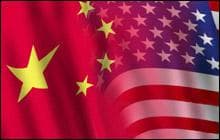Advertisement
China's Dot Communism
 China's ailing leader, 76-year-old Jiang Zemin, may soon step down. His potential replacement is China's Vice President Hu Jintao. Succession doesn't happen often in China, and the talk behind this transfer of power is creating a climate of intrigue in Beijing and beyond.
China's ailing leader, 76-year-old Jiang Zemin, may soon step down. His potential replacement is China's Vice President Hu Jintao. Succession doesn't happen often in China, and the talk behind this transfer of power is creating a climate of intrigue in Beijing and beyond.Lurking beneath the dramatic skylines of Shanghai and Beijing is a political crisis - one that's receiving little attention. The giant country is stretching itself around two fundamental contradictions of political and economic development. The resulting "marriage" between Leninism and capitalism has only deepened the contradiction. How can China's communist party survive as it encourages a system of freemarket liberalization?
Our guest tonight says it can't. The first challenge to the future of the country lies in the transition of power on the horizon. The world will have to question its prevailing assumptions about China. The United States will have to decide if it looks at this Eastern giant as potential partner or a "strategic competitor".
But most of all, will increasing state-society tensions destabilize China? And if it does, what could the global fallout be?
Guests:
Minxin Pei - Senior Associate at the Democracy and Rule of Law Project, Carnegie Endowment for International Peace, and author of "China's Governance Crisis" in the September/October 2002 issue of Foreign Affairs
Jeff Muir - Director of Asia-Pacific Government Relations for Vivendi Universal
This program aired on August 27, 2002. The audio for this program is not available.